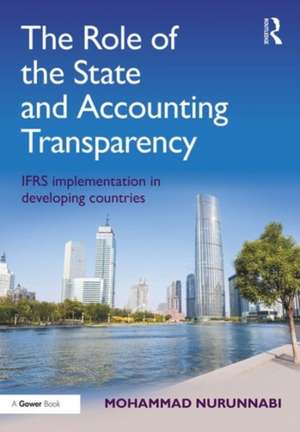The Role of the State and Accounting Transparency: IFRS Implementation in Developing Countries
Autor Mohammad Nurunnabien Limba Engleză Hardback – 4 apr 2016
| Toate formatele și edițiile | Preț | Express |
|---|---|---|
| Paperback (1) | 234.83 lei 6-8 săpt. | |
| Taylor & Francis – 20 iun 2018 | 234.83 lei 6-8 săpt. | |
| Hardback (1) | 850.54 lei 6-8 săpt. | |
| Taylor & Francis – 4 apr 2016 | 850.54 lei 6-8 săpt. |
Preț: 850.54 lei
Preț vechi: 1142.11 lei
-26% Nou
Puncte Express: 1276
Preț estimativ în valută:
162.78€ • 169.49$ • 137.57£
162.78€ • 169.49$ • 137.57£
Carte tipărită la comandă
Livrare economică 07-21 martie
Preluare comenzi: 021 569.72.76
Specificații
ISBN-13: 9781472430649
ISBN-10: 1472430646
Pagini: 242
Dimensiuni: 174 x 246 x 24 mm
Greutate: 0.61 kg
Ediția:1
Editura: Taylor & Francis
Colecția Routledge
Locul publicării:Oxford, United Kingdom
ISBN-10: 1472430646
Pagini: 242
Dimensiuni: 174 x 246 x 24 mm
Greutate: 0.61 kg
Ediția:1
Editura: Taylor & Francis
Colecția Routledge
Locul publicării:Oxford, United Kingdom
Cuprins
1. Introduction
2. Review of Literature
3. Theory
4. Financial Reporting Environment in Bangladesh
5. Research Methodology
6. The relative impact of accounting regulatory frameworks and politico-institutional factors
7. The impact of training opportunities in the accounting profession, corruption and country specific factors
8. Theory of the role of the state in the implementation of IFRS
9. Conclusions
References
Appendices
Index
2. Review of Literature
3. Theory
4. Financial Reporting Environment in Bangladesh
5. Research Methodology
6. The relative impact of accounting regulatory frameworks and politico-institutional factors
7. The impact of training opportunities in the accounting profession, corruption and country specific factors
8. Theory of the role of the state in the implementation of IFRS
9. Conclusions
References
Appendices
Index
Notă biografică
Mohammad Nurunnabi FHEA FRSA FAIA(Acad) is an Associate Professor in Accounting and Chair of the Department of Accounting at Prince Sultan University, Riyadh, Saudi Arabia. He holds a PhD in Accounting (International Financial Reporting Standards – IFRS) with outright pass (no corrections) from the University of Edinburgh, UK. Previously he was a Senior Lecturer in Accounting and Research Leader in the Accounting Group at the University of East London, UK. He also taught in University of Bedfordshire, UK and Edge Hill University, UK. He teaches Advanced Accounting, Accounting Theory, Auditing and Management Accounting. He is an Editorial Member of eight journals and reviewer of 41 journals.
Recenzii
’The International Accounting Standards Board (IASB) has made rapid progress towards the development and adoption of International Financial Reporting Standards (IFRS) throughout the world. Currently, more than 138 jurisdictions have adopted IFRS, including the G20 nations. This book is an engrossing rendition of how politics, accounting regulation and culture facilitate and disrupt the implementation of IFRS in developing countries. This readable account of the checkered journey of IFRS would be insightful to Masters and PhD students of accounting research and to policy makers and practitioners. The book contains a wealth of valuable information (conceptual and practical foundations) and it is notable for its comprehensive (nine chapters) yet easily understandable discussion of the literature. In addition, it offers a provocative future research agenda.’ S.P. Kothari, Massachusetts Institute of Technology, USA and Editor, Journal of Accounting and Economics ’Mohammad Nurunnabi has introduced an important textbook that is ideally suited to both researchers and practitioners who are interested in the implementation of IFRS in developing economies. It offers a good balance between theory and practice. It provides an excellent coverage of a number of important issues not commonly covered in most accounting textbooks. The findings of this research have policy implications that are relevant for Bangladesh, and other developing countries.’ Khaled Hussainey, Plymouth University, UK ’As more than a hundred countries have adopted IFRS and others are in transition to IFRS, the demand for publications on country-specific practical experiences, challenges, and accomplishments in implementing IFRS is growing at an exponential rate. This book undoubtedly should prove very useful to all readers seeking insights into the depth and breadth of issues relating to IFRS implementation in developing countries, especially in Bangladesh.’ Eva K. Jermakowicz, Tennessee State U
Descriere
This book examines the factors affecting the implementation of International Financial Reporting Standards in developing countries and answers these specific research questions: What is the relative impact of accounting regulatory frameworks and politico-institutional factors on the implementation of IFRS in developing countries? How do cultural factors affect this? How does a study of implementing IFRS help build an understanding of a theory of the role of the state in accounting change in developing countries? It contributes to military and democratic political regimes and the Max Weberian view of the theory of the role of the state's attitude towards accounting transparency.

























